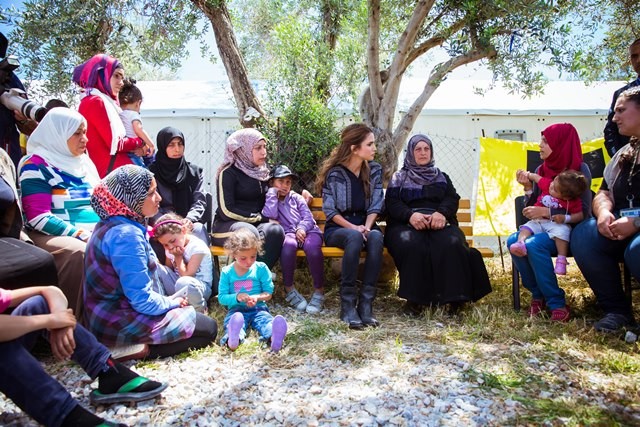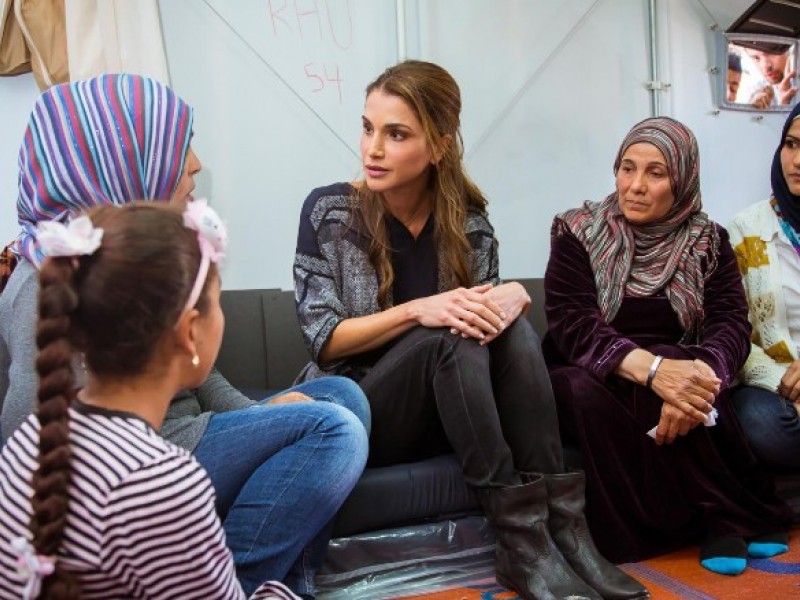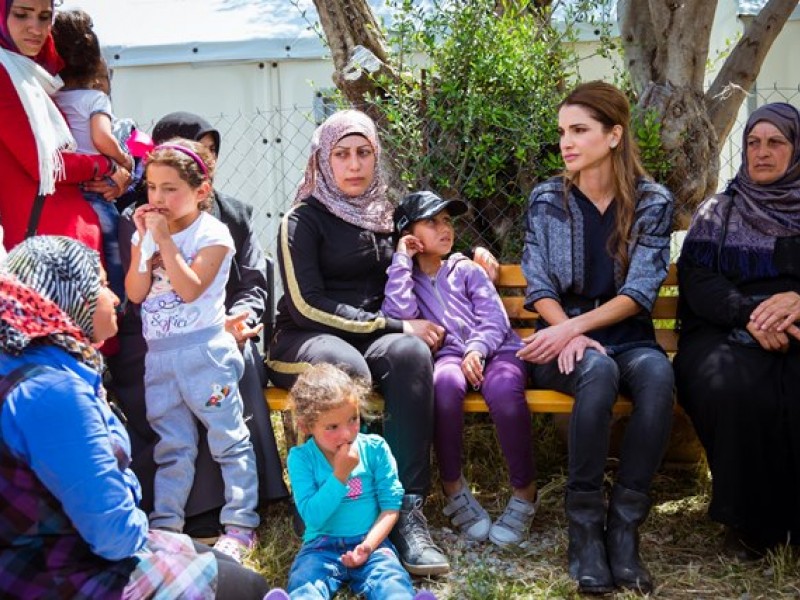Queen Rania: The Syrian Refugees I Met Are Experiencing Something Worse than Death
The Washington Post

In his novel “Blindness,” José Saramago asks us to imagine a world where one by one, people lose their sight. The epidemic triggers apocalyptic scenes of panic, cruelty, disorder and, eventually, the breakdown of society. It’s fiction, of course. After all, how could the whole world go blind?
That’s what I used to think.
After visiting the Kara Tepe camp in Lesbos, Greece, last week to meet a group of refugees and to support the life-saving work of the International Rescue Committee, I think truth could be stranger than fiction. In fact, I’m thinking about writing a sister novel to Saramago’s.
I’d call it “Deafness.” Because no one’s listening.
No one’s listening to the nearly 155,000 refugees who have risked their lives to reach Greece since the start of this year.
No one’s listening to Maha, the bright and articulate 24-year-old gynecologist trainee from Raqqa, Syria. For nearly four years, she defied the odds — conflict, threats, danger and deprivation — to study and work in a hospital. What kept her there, she told me, was that “the needs were so great, and doctors were in such short supply.” But, in March, finally, so scared that Daesh, also known as ISIS, would target her, she succumbed. She made the heart-rending decision to abandon her vocation and fled through 46 checkpoints guarded by all parties to this conflict — each one a frightening ordeal — to get to the Turkish border. If the fighters — on either side — found out she was a doctor, they likely wouldn’t let her leave, so she sewed her papers into the lining of her jacket to conceal them.
During parts of her trip, this talented young medic, just one year away from qualifying to be a gynecologist, crawled through mud to avoid being caught. “I never felt safe — not for a single minute,” she whispered. “I still don’t.”
“From death to death to death” is how she described the ordeal of those who finally reached the shores of Lesbos. “All we want is a new chance at life.”
No one’s listening to her mother, Sadaa, either. All she wants is to see her sons, who are in Germany. “I got as far as Macedonia,” she said, “but then I came back to get my daughter, and then the borders closed. Now, I’m here with her, my sons are in Germany and my husband is in Syria with his sick father. What do I do? Where do I go?”
And no one’s listening to Fatina, who, just one month ago lost her husband on a boat as they fled Turkey. Eighty refugees were forced at gunpoint onto a dinghy designed for 25. They were crammed in, literally, one on top of the other. Her husband, at the bottom of the pile at the front of the inflatable craft, drowned. The only thought that kept her going on the terrifying sea crossing was that they had escaped Syria and were on their way to start a new life with their four children: 18-month-old twins, a boy and a girl; and two daughters, 4 and 6.
In front of her children, she puts on a brave face. “God gives you power,” she said. But when her children aren’t looking, tears tumble down her cheeks. “I just don’t know what to do,” she sobbed, cradling her head in her hands.
Each and every story is harrowing. Exhaustion hangs, thickly, in the air. I wonder how much more these women can endure. Each and every story is different, but they are linked by the threads of helplessness, hopelessness and despair. These are women at their breaking point.
There’s only one thing worse than enduring brutal conflict, escaping your homeland, leaving behind everything you know, abandoning your dreams, risking your life, becoming destitute, being abused, fragmenting your family, watching your children suffer and losing loved ones, and it is this: arriving at a place you think is a haven only to be told you will likely be sent back. No one is sure when. No one is sure where. That is the definition of futility — and it’s cruel. Because no one chooses to be a refugee. Refugees are refugees because the alternative used to be death. Now, there’s a worse option: a living death. That is what I saw on Lesbos.
Once you hear their stories, you can’t un-hear them. So, maybe it’s not that the world can’t hear. Maybe it’s that it won’t hear. Maybe it’s not an epidemic of deafness, but of selective hearing — we hear only what we want to hear and shield ourselves from what we don’t want to confront.
Because if the world listened to the stories — in Greece, Lebanon, Jordan (the kingdom estimates that there are 1.3 million Syrians now living there) and beyond — more people would feel compelled to act. And small acts of kindness would give way to bigger and bolder ones — which would give way to humane policies to help refugees.
But, first, we all must listen. To the sighs and the screams and the stifled sobs. To the exhausted exhalations and the broken voices. To the prayers and the wretched memories. To the whispered pleas: “All we want is a new chance at life.”
They’re telling us a story — a nonfiction story. Let’s dignify them by listening, and by supporting them in practical and lasting ways.
Featured
Queen Rania's official website
This website does not support old browsers. To view this website, Please upgrade your browser to IE 9 or greater
Your browser is out of date. It has known security flaws and may not display all features of this and other websites. Learn how to update your browser



